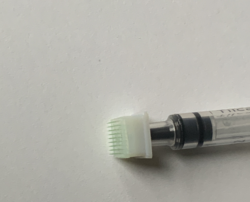Collaborators led by Carnegie Mellon University are developing a novel approach to COVID-19 inoculation that addresses both immunological effectiveness and manufacturing efficiency with a low-dose, inexpensive, hybrid microneedle array (Hybrid-MNA) technology.
immunological effectiveness and manufacturing efficiency with a low-dose, inexpensive, hybrid microneedle array (Hybrid-MNA) technology.
The Hybrid-MNA is a new, intradermal delivery device that builds on more than a decade of work on microneedle array technology by Burak Ozdoganlar, professor of mechanical engineering and the project’s principal investigator.
The novel vaccine delivery method allows for a very small amount—potentially 1/100th of the dose of a traditional vaccine—to elicit strong and long-lasting immunity against SARS-CoV-2 infections. This can significantly help to reduce vaccine shortages.
A second focus of the project is optimizing and automating the production process for the Hybrid-MNAs. This will include using 3D printing during the fabrication process and robotic automation during production. Both will ensure efficient and inexpensive manufacturing of the devices.
Because the Hybrid-MNAs do not require the same level of cold-chain storage as other vaccines, they will be more easily transported and stored.
This two-fold approach to tackling the COVID-19 pandemic earned the multidisciplinary team a $643,359 grant from the Commonwealth of Pennsylvania. In addition to Carnegie Mellon, collaborators include the University of Pittsburgh Center for Vaccine Research and industrial partners Boston Micro Fabrication, Premier Automation, and Tiba Biotech.
“Our team brings a proven track record of multidisciplinary expertise and experience in immunology, vaccine design, development and delivery, 3D printing, and industrial robotic-automation,” said Ozdoganlar, who is also the associate director of Carnegie Mellon’s Engineering Research Accelerator.
“We are thrilled to collaborate with Professor Ozdoganlar and Carnegie Mellon on such an important and impactful project. Our micro-precision 3D printing technology allows for the rapid and precise fabrication of micro needle arrays, resulting in time and cost savings that far exceed traditional manufacturing methods,” said John Kawola, CEO of Boston Micro Fabrication.
“While there have been impressive advances in modern vaccine technologies, we are still using an 18th century delivery device,” said Karl Ruping, CEO of Tiba Biotech. “The Hybrid-MNA approach not only allows smaller dosing, it is pain-free and has the potential for self-administration.”
This article was originally published at: https://www.meche.engineering.cmu.edu/news/2021/03/scalable-manufacturing-for-painless-vaccines.html.

